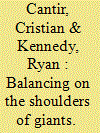|
|
|
Sort Order |
|
|
|
Items / Page
|
|
|
|
|
|
|
| Srl | Item |
| 1 |
ID:
141654


|
|
|
|
|
| Summary/Abstract |
“Soft balancing” has emerged as a way to reconcile realist theory with the lack of hard balancing behavior against US hegemony. Scholars continue, however, to disagree on the concept's utility and causes. Consistent with its realist roots, scholars have primarily focused on power imbalance and external threat to security as causes of soft balancing. This article analyzes Moldova's major foreign policy shift in the mid-2000s. It argues that this was a clear example of soft balancing and that it adds several important insights into the causes of soft balancing. While the power imbalance and external threat from Russia were persistent throughout Moldova's post-independence history, the country only adopted a soft balancing strategy once Russia posed a threat to the internal stability of the government and changes in EU policy created a permissive international environment for the strategy. Moreover, we argue that the domestic political environment played a key role in enabling the adoption of this strategy. This article therefore diversifies the analysis of the causes of soft balancing and provides a theoretical answer for the puzzle of Moldova's pro-Western turn in 2003.
|
|
|
|
|
|
|
|
|
|
|
|
|
|
|
|
| 2 |
ID:
141655


|
|
|
|
|
| Summary/Abstract |
Existing research has shown that individuals have a fairly defined and consistent ideology when it comes to foreign policy. However, exploring how a foreign policy ideology influences more specific policy preferences is largely understudied. I apply this concept of a foreign policy ideology in understanding conflict preferences in the recent conflicts in Afghanistan and Libya. Results demonstrate that a foreign policy ideology has a strong influence on preferences in both conflicts, but that this influence is determined by the context of the interventions. This effect of a foreign policy ideology is even greater, at times, than that of the more traditional explanations.
|
|
|
|
|
|
|
|
|
|
|
|
|
|
|
|
| 3 |
ID:
141653


|
|
|
|
|
| Summary/Abstract |
Democratic victors hoping to protect war gains by forcing the vanquished to be free must not only overcome the problems associated with imposed democracy but also ensure continued influence over and interests in the newly democratic state. To secure this dual imperative, I argue victors must coercively socialize the vanquished state. I create a framework of coercive socialization and conduct a plausibility probe of the theory by detailing the imposition strategies the United States utilized to transform the Federal Republic of Germany into a reliable democratic partner after World War II. The findings suggest imposing democracy to ensure peace and secure interests is likely to succeed only under even more limited conditions than recent scholarship on imposed democracy allows and also lend insight into why the US effort to impose democracy on Iraq is unlikely to provide the benefits policymakers sought.
|
|
|
|
|
|
|
|
|
|
|
|
|
|
|
|
| 4 |
ID:
141652


|
|
|
|
|
| Summary/Abstract |
With ten attempts since 2010, coups d'état are surprisingly common events with vital implications for a state's political development. Aside from being disruptive internally, coups influence interstate relationships. Though coups have important consequences, we know little about how the international community responds to these upheavals. This paper explores what drives global actors to react to coups. Our theory differentiates between normative concerns (for example, protection of democracy) and material interests (for example, protection of oil exports) as potential determinants of international responses to coups. We argue that coups against democracies, coups after the Cold War, and coups in states heavily integrated into the international community are all more likely to elicit global reaction. Using newly collected data, we explore the number of signals that states and IOs send to coup states from 1950 to 2011. The analyses reveal that coups against democracies and wealthy states draw more attention. States react when democracies are challenged by coups, while IOs react to coups in Africa and coups during the post-Cold War period. We surprisingly find that heavy traders and oil-rich states do not necessarily receive more reaction, suggesting that international actors are more driven by normative concerns than material interests when reacting to coups.
|
|
|
|
|
|
|
|
|
|
|
|
|
|
|
|
| 5 |
ID:
141656


|
|
|
|
|
| Summary/Abstract |
This article sets out how secondary powers in South America—that is, Argentina, Chile, and Venezuela—see Brazil as a regional power, as well as Brazil's strategy of using its regional powerhood to further its own ambitions of becoming a global power on the international stage. The article assesses the expectations of these three countries, specifically in terms of what kind of roles they attribute to Brazil. Following this empirical interest, the article develops a role theoretical framework for understanding the importance of Others' expectations for the role con-ception and enactment of the Self. The article also elaborates on the interplay of master roles and auxiliary roles in which Others become key shapers of those roles, as well as on how the role interaction between a regional power and the secondary powers is bound to their differing notions of “region,” as strategically used by each as part of their foreign policy.
|
|
|
|
|
|
|
|
|
|
|
|
|
|
|
|
|
|
|
|
|